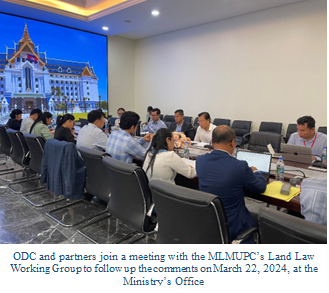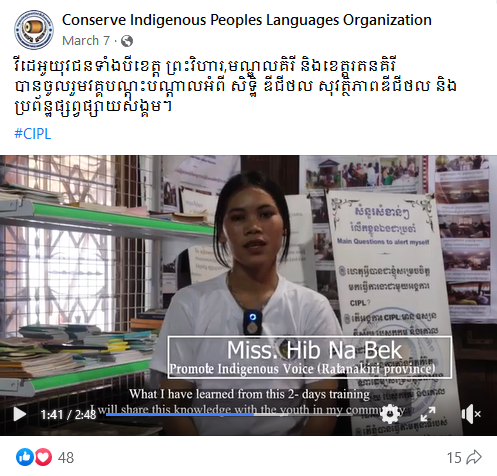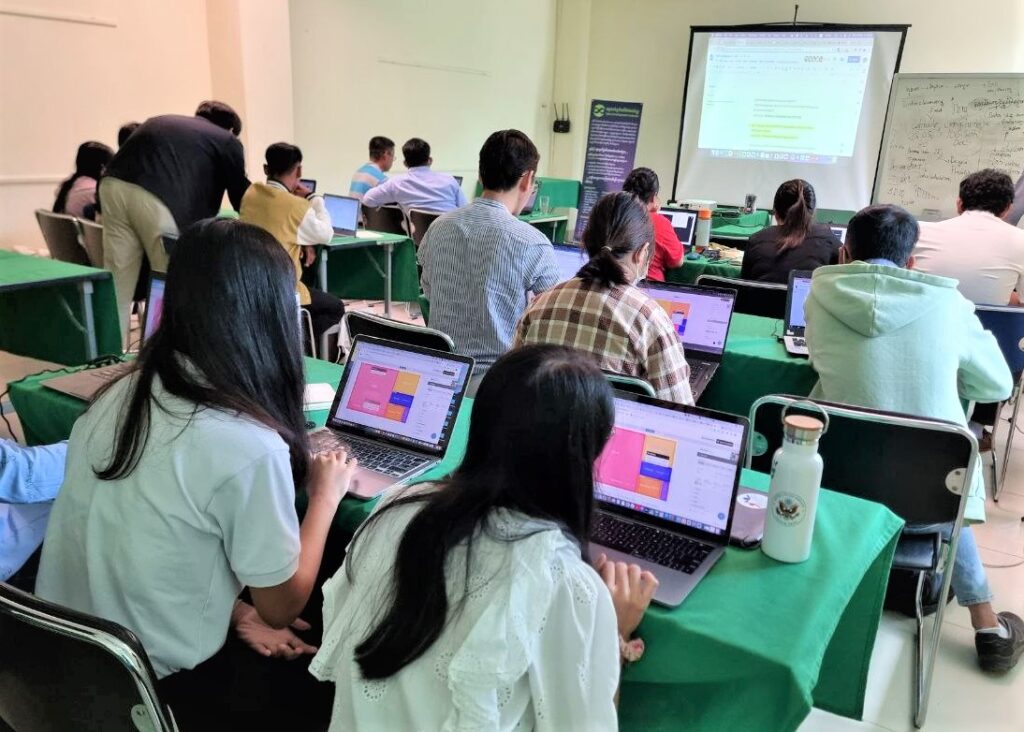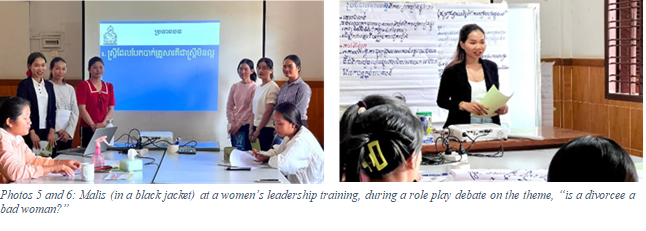The ODC’s Civil Society Support Activity: Cluster Anchor Grant initiative demonstrates the value of collaborative advocacy and strategic participation in achieving legislative reforms that benefit society.
ODC’s path, which focuses on promoting meaningful engagement in natural resource management and building social inclusion, shows devotion, determination, and effective action. Our effort ensures that the voices of communities, Community-Based Organizations (CBOs), and Civil Society Organizations (CSOs) are not only heard but also integrated into the drafting process of the Land Law, which governs land rights and management in Cambodia. In January 2024, ODC began the process by formally requesting the draft Land Law from the Ministry of Land Management, Urban Planning, and Construction (MLMUPC), paving the way for collaborative involvement.

When ODC received the draft Land Law in February 2024, its team immediately began mobilizing efforts. ODC organized coordinated events and dialogues to promote extensive consultations and discussions, involving stakeholders at both the sub-national and national levels. Working with legal experts, ODC ensured that the complexity of the legislation was clarified, allowing for involvement and informed input from the grassroots to the national level. ODC’s collaborative efforts paid off, as we had inputs that reflected diverse viewpoints. With 60 pages of the matrix comments, ODC submitted its inputs to the Ministry within a tight timeframe (February 16), demonstrating its commitment to constructive participation and lobbying.
Beyond the submission, ODC realized the value of ongoing communication and advocacy. Addressing gender equality in land ownership and encouraging continuous talks among CSOs, ODC highlighted concerns and options for future engagement with the Ministry. ODC’s proactive approach resulted in a follow-up meeting request, indicating its commitment to ensure that ODC’s inputs are not just recognized but also included in the legislative process.
“Thank you! I appreciate the inputs and comments from the CSOs on the Draft Land Law. If the government asks the consultant to do it, it might take a million dollars to do so”, H.E. THENG Chan-Sangvar, Secretary of State and MLMUPC’s Land Law Working Group.
The impact of ODC’s combined efforts was clear when the Ministry acknowledged and integrated more than 15 points from ODC’s submission, indicating a significant step toward inclusive policymaking. While ODC’s efforts are not always directly acknowledged, the realization of their combined impact emphasizes the significance of ongoing lobbying and collaborative participation. Contributing to the new draft Land Law, ODC remain committed to working for communities’ rights and interests. Armed with knowledge, unity, and a common vision for a more fair and equitable society, ODC are prepared to face the challenges ahead, confident in its power to affect significant change through collective action.
Similar Stories
CIPL’s video on digital rights and social media training
The training covered the topics of human rights, digital rights, digital media, and digital trends in Cambodia. Pre and post-test results illustrated that 73% of the trainees improved their knowledge regarding digital security and rights.
Data storytelling by data visualization trainees
Data is an essential component of every organization and journalist. Finding the value in data and communicating that value to your target audience needs time. Simply displaying spreadsheets with rows of numbers is insufficient for demonstrating the significance of data. However, when data is presented in the form of a story, individuals are more likely to appreciate its significance and respond accordingly. The good news is that people enjoy reading stories. Storytelling has long been a great tool for educating, explaining, and influencing a specific audience or intended activities. On 20-21 and 26 December 2022, ODC conducted training on “Data Visualization and Storytelling” to equip participants with basic data visualization and storytelling skills. The trainees have learned about the principle of data as well as using data for product visualization and short storytelling. Even though we have a short time, our trainees could produce such a visualization and combine it into a story that could present data. Note: The stories shown do not have further assessment or review. These are just participants\' practice exercises only. Story 1: The special economic zones in Cambodia The trainees produced storytelling by using visualization named \"Most of Cambodia\'s special economic zones do not unveil the specific companies\' number.\" The special economic zones in Cambodia do not show the specific number of companies, indicating that they are still in the planning stages and are not yet operational. It is critical to take more action and complete those projects with high investment capital that follow the regions. Cambodia\'s potential economic zones include Phnom Penh, Kandal, Preah Sihanouk, Svay Rieng, and Koh Kong, based on data. Story 2: Hydropower dam along the Mekong River and energy consumption Visualizations are used to illustrate the number behind the Mekong hydropower dam. Cambodia, Thailand, Laos, Myanmar, and Vietnam all have one thing in common: they would like to build a dam. As regional and global energy consumption and concern about climate change grow, one solution that can help address both at the same time is building hydropower dams in the Mekong region. Vietnam is the leading country in terms of energy consumption, with numbers steadily increasing up until the recent 2020 deadline. One thing is certain: electricity consumption is rising in all countries and shows no signs of slowing. A number of hydropower projects are planned across the five Mekong countries. Myanmar has the most hydropower plans, with a total capacity of 61,412.1 MW. However, the majority of the plans are still in the planning stages, despite the fact that Vietnam has the highest hydropower project operational rate. Renewable energy\'s future is bright, but some argue that it has taken far too long. Story 3: The most potential hydropower sites in Cambodia Our Trainees also used hydropower data from the ODC website to show which provinces have a lot of hydropower. The results show that the majority of hydropower dams are located in Cambodia\'s northeast, specifically in the provinces of Kratie, Stung Treng, and Ratanakiri. Kong Koh province also has a large number of hydropower dams. Story 4: Cambodia\'s deforestation in the last 20 years Indigenous youth from Ratanakiri province created a short story titled \"Is the forest in Cambodia truly lost?\" based on Global Forest Watch data. Data on deforestation in Cambodia show a significant increase from 2001 to 2010 but a slight decrease from 2011 to 2021. Story 5: Fishing trend by region between 2009 and 2019 in Cambodia In the short storytelling using visualization \"Fishing Activities by Zones,\" fishing zones such as the plain zone, Tonle Sap zone, plateau/mountain zone, and coastal zone are depicted. Cambodia has 20 provinces with Community Fisheries (CFi). In comparison to the other 19 provinces, Koh Kong Province has the most CFis, followed by Pursat and Prey Veng. The CFis in Svay Rieng is the fewest.
Breaking chains: A woman’s journey from a violent trap to freedom
Mrs. LEV Malis, 27, from Pouk District, Siem Reap Province was married to a violent and cheating man for seven years, with whom she had two children. Mrs. Malis got depressed and did not dare to go out or face the problem. Sometimes she considered ending her life. She had no one listen to her or be her peer support but was instead blamed by her parents for not being patient enough to be a good woman. One day, Malis met a leader of Community Based Organization (CBO), Mrs. Tep Mey, who gave her advice and referred her to the Banteay Srei Organization, which provides support to women who are victims of domestic violence. Through the support of Banteay Srei, Malis embarked on a new journey of hope, confidence, and be able to live free from violence. She left her husband, taking her two children with her, and is seeking a divorce, a decision that requires her to overcome many challenges, including social norms that frown on divorce and a difficult legal process. On September 14, 2022, Malis decided to become a volunteer for Banteay Srei. She attended her first training courses on leadership, self-awareness and facilitation skills and then joined many other workshops about gender-based violence, sexual harassment, abuse and other topics. After attending training workshops and meetings, she gained courage, and shared some of her life experiences, including how she built her self-esteem and self-motivation. In December 2022, she had gained enough confidence to be a guest speaker in the 16-day Campaign to discuss the topic “End Violence Against Women.” In early 2023, Malis started her own small business in Pouk Market, Siem Reap Province. Her business provides enough income to take care of her two children. She was inspired to share her good business start-up experience, including using digital technology and online marketing, with other women leaders at the Women Leadership Forum in April 2023.


